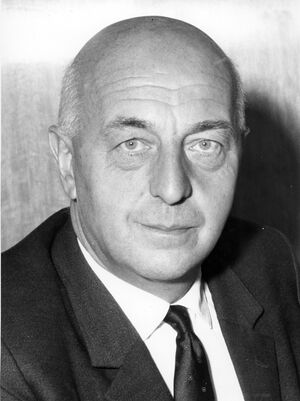Sicco Mansholt
( politician) | |||||||||||||||||||
|---|---|---|---|---|---|---|---|---|---|---|---|---|---|---|---|---|---|---|---|
 | |||||||||||||||||||
| Born | Sicco Leendert Mansholt 13 September 1908 Ulrum, Netherlands | ||||||||||||||||||
| Died | 29 June 1995 (Age 86) Wapserveen, Netherlands | ||||||||||||||||||
| Nationality | Dutch | ||||||||||||||||||
| Alma mater | University of Amsterdam | ||||||||||||||||||
| Children | 4 | ||||||||||||||||||
| Spouse | Henny Postel | ||||||||||||||||||
| Member of | Clingendael Institute, Club of Rome, Netherlands Atlantic Association | ||||||||||||||||||
| Party | Labour Party (Netherlands) | ||||||||||||||||||
Attended the 1963 and 1964 Bilderberg, later installed as President of the European Commission. In 1971 he became a proponent of the Club of Rome's degrowth plans.
| |||||||||||||||||||
Sicco Leendert Mansholt was a Dutch farmer and politician who was installed as President of the European Commission from 1972 until 1973. He attended 2 Bilderberg meetings, in 1963 and 1964.
In 1971, he who had promoted an expansionist agricultural policy in Europe as commissioner for agriculture pushing for policies that created massive agricultural surpluses, showed a radical change of outlook after reading a preprint of the Club of Rome's The Limits to Growth report. He now favored a doctrine of non-growth, or even of "growth below zero", that is, degrowth.[1]
Contents
Background
Mansholt came from a socialist family of Groningen gentlemen farmers. His father Lambertus H. Mansholt was a member of the Provincial Council of Groningen and a deputy for the SDAP, the predecessor of the Dutch Labour Party. His mother Wabien Mansholt-Andreae had studied political science as one of the country's first women.[2]
Mansholt attended the HBS in Groningen and then went to the Tropical Agricultural School in Deventer, where he trained as a tobacco planter which he completed in 1929. After this, he worked at the agricultural crisis bureau. In 1934 he left for Java in the Dutch East Indies to work on a tea plantation. However, the colonial system oppressed him and so he returned to the Netherlands in 1936. He wanted to become a farmer and in 1937 settled in the newly cultivated Wieringermeer, where he operated an agricultural business.[2][3]
During the war years, Mansholt was active in the resistance.[3]
Post-war career
In June 1945, Prime Minister Willem Schermerhorn of the PvdA brought him into his cabinet as Minister of Agriculture, Fisheries and Food Supply, where he was the youngest minister at the age of 36. He put Dutch agriculture on a course of modernization, refinement and export, which it pursues to this day. In the early 1950s, however, the effects of his successful agricultural policy began to wear off somewhat, as other countries also began to adopt protectionist measures for the benefit of domestic agriculture. Mansholt therefore developed a plan in 1950 for the establishment of a common market for agricultural products with a supranational governance structure. Due to internal contradictions in Europe, his ideas could not count on much support, so in 1953 negotiations on this broke down. However, Mansholt was convinced that a European market had the future and in the various Dutch Ministerial Councils of which he was a part, he was always a strong supporter of European integration.[2]
In December 1957, Mansholt was nominated as the first European Commissioner from the Netherlands. In February 1972 Mansholt was nominated as President of the European Commission. The Mansholt Commission was installed on 1 March 1972 and oversaw the creation of the European Monetary System on 24 April 1972 and the first enlargement on 1 January 1973.[2][3]
Board positions
After his retirement, Mansholt occupied numerous seats as a nonprofit director for supervisory boards for several international non-governmental organizations and research institutes (Institute of International Relations Clingendael, European Centre for Development Policy Management, Netherlands Atlantic Association, Transnational Institute, Club of Rome, Humanistic Association, Royal Holland Society of Sciences and Humanities and the Carnegie Foundation) and as an advocate and lobbyist for European integration. [2]
An appointment by Sicco Mansholt
| Appointee | Job | Appointed | End |
|---|---|---|---|
| Alfred Mozer | Chief of Cabinet | 1958 | 1970 |
Events Participated in
| Event | Start | End | Location(s) | Description |
|---|---|---|---|---|
| Bilderberg/1963 | 29 March 1963 | 31 March 1963 | France Cannes Hotel Martinez | The 12th Bilderberg meeting and the second one in France. |
| Bilderberg/1964 | 20 March 1964 | 22 March 1964 | US Virginia Williamsburg | A year after this meeting, the post of GATT/Director-General was set up, and given Eric Wyndham White, who attended the '64 meeting. Several subsequent holders have been Bilderberg insiders, only 2 are not known to have attended the group. |